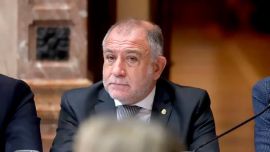Economy Minister Martín Guzmán surprisingly called for a peso debt bond swap on Wednesday to dilute payments of almost 600 billion pesos falling due at the end of the month.
The official’s idea was a seven-month rollover offering the same instruments, part of a bid to deflate the peso debt pressure. Launched as an "intermediate tender," Guzmán sought to refinance two peso bonds falling due next Thursday when no less than 595 billion pesos has next Tuesday as its deadline.
A government statement late Wednesday night announced that the Economy Ministry had exchanged 358 billion pesos (US$2.9 billion) in local securities due at the end of the month for new notes maturing later this year. The exchange amounted to around 60 percent of the local debt due on June 30, according to Bloomberg.
The fund manager arm for the state-run pension agency ANSES, which held about 15 percent of the upcoming maturities, was said to have participated in Wednesday’s swap, according to one person with direct knowledge of the matter.
An ANSES spokesperson didn’t immediately reply to a request for comment on its participation.
The Central Bank is also a large holder of the bonds coming due at the end of the month, with over 35 percent of the upcoming short-term debt, according to another person with direct knowledge. A Central Bank spokesperson declined to comment on its participation.
The unexpected operation comes after a steep sell-off in Argentina’s local market earlier this month in which investors yanked cash from funds focused on inflation-linked assets on speculation that the large local debt burden would prove unsustainable for the government.
The local market jitters, along with runaway inflation and a global sell-off in risk assets have caused Argentina’s overseas bonds to tumble to record lows.
IMF complications
One of the key aims of the move is to reduce the Central Bank assistance to the Treasury, which this year can only be one percent of Gross Domestic Product according to the government’s recent agreement signed with the International Monetary Fund (IMF).
This week was crucial for the multilateral organisation, whose board of directors are due to meet on Friday to decide whether to approve Argentina’s first IMF quarterly review. A remittance of US$4.1 billion depends on the decision – the second such payment under the agreement reached last month and only to be paid if Argentina complies with mutually agreed objectives.
Earlier this month the authorities of the Economy Ministry and the IMF staff reached a technical agreement approving the first review of the ongoing programme. The first remittance of US$9.8 billion was received immediately after approval of the agreement.
Late Wednesday, the government made a US$2.684-billion payment to the Fund, in anticipation of new funds arriving. Following the payment, the Central Bank’s reserves dropped to US$38.229 billion.
According to Télam news agency, Guzmán's team is confident that IMF directors will not object to approving to technical agreement and will clear the way for the reception of US$4.1 billion in time to meet this month’s deadlines without any problems.
‘Internal debt’
The issue of "internal debt" has been controversial in recent weeks with the government accusing the Juntos por el Cambio opposition coalition of promoting a “reprofiling” of peso debt if it returns to government next year.
That idea, in conjunction with the lack of Central Bank reserves and rising inflation, has pushed up the “blue” parallel dollar beyond 220 pesos at times last week. Guzmán himself had to come out in denial of a default in pesos, maintaining there is "no problem" in meeting commitments.
"Whoever says that Argentina’s public debt in pesos is unsustainable has no idea what they are talking about and would not pass a basic exam in the [Economics] Faculty," argued the minister.
Nevertheless, various operators and institutional investors still have serious doubts as to whether the state can meet its commitments, as was made manifest on June 8 and 9 when there was a rush to sell-off mutual fund investments.
Confidence
Wednesday’s bond swap sought to postpone the next deadline to between August and November but the May fiscal deficit figures worked against generating the necessary confidence.
Last month’s 191 billion pesos in the red for public accounts contrasts with the 25 billion surplus for May last year as measured by the IMF. May’s deficit was by far the highest monthly figure in 2022, explaining 40 percent of the total accumulated so far this year. The primary fiscal deficit grew 130 percent as against April, a signal which will not generate confidence among the investors who have to finance the state.
– TIMES/AFP/BLOOMBERG/NA
























Comments